Porcelain veneers
Porcelain veneers are a great proposition of modern aesthetic dentistry to improve the aesthetics of the smile. These are constant prosthetic additions used to cover the outer unsightly surfaces of the upper and lower teeth. Veneers are made entirely of porcelain – without a metal substructure, therefore they allow to get an excellent aesthetic effect and change every smile. A big advantage of full-ceramic veneers is that they require much less grinding of teeth than to make a prosthetic crown – they allow to spare healthy tooth tissues. The thickness of porcelain veneers according to the need is only 0.5-1.0 mm, so the interference with the hard tissues of the tooth is minimal. What is the course of treatment? Here is a simplified scheme:
- First visit: During a conversation with the patient, the dentist learns about his aesthetic expectations and presents possible variants of improving the aesthetics of the smile. After qualifying the patient for porcelain veneers, the dentist grinds his teeth under the veneers and gets squeezed. In the case of large aesthetic work, the doctor on the first visit gets squeezed to present to the patient the final aesthetic effect with the help of trial veneers and grinding begins only on the next visit, after accepting the shape and appearance of future veneers
- Second visit: the dentist tries on ready-made porcelain veneers and, after possible corrections, proceeds to cement permanently in the patient's mouth
Faqs:
- What are the indications for porcelain veneers? – indications for the use of veneers are:
- difficult to whitewash tooth discoloration
- glazed and dentin underdevelopment
- unsightly filling of the front teeth
- tooth edge cavities, snooping of the angles of the edges of the
- diastemy and jitters between teeth
- unacceptable shape of the front teeth by the patient.
- Are there any contraindications to porcelain veneers? – Yes, contraindication to the use of veneers is habitual teeth grinding, some malocclusion and poor oral hygiene. Veneers are also not performed on dead teeth, after root canal treatment and on teeth with large fillings. In such a situation, all-ceramic crowns are the optimal solution. If the planned shape correction is not too large, additive veneers may be a good solution – they allow you to correct the shape and appearance of teeth completely without grinding.
- What is the durability of porcelain veneers? – Recent studies on a group of over 1400 patients with porcelain veneers have confirmed their very high durability. The 10-year shelf life of the mouth was set in as many as 93% of cases, which means that out of 100 porcelain veneers 10 years after the founding of as many as 93 veneers are in optimal condition and perform their functions. This is much better than, for example, for dental fillings.
- Can porcelain veneers discolor? – porcelain from which veneers are made is characterized by very high smoothness and thus is completely resistant to discoloration. There is no such risk, unlike composite veneers, which after a while can become more porous and can discolor.
See the effects of treatment:
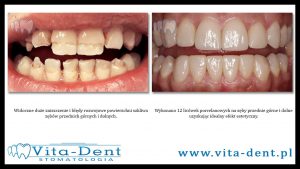
12 porcelain veneers of upper and lower teeth
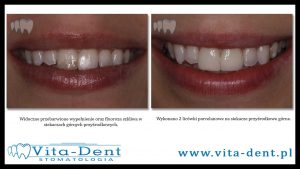
2 porcelain veneers on top incisors
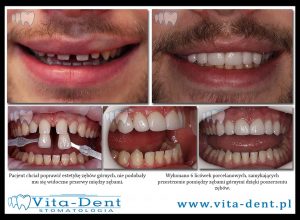
6 porcelain veneers on upper teeth
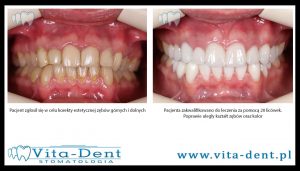
20 porcelain veneers
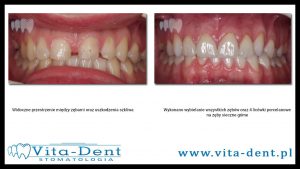
Porcelain veneers – closing interdental spaces
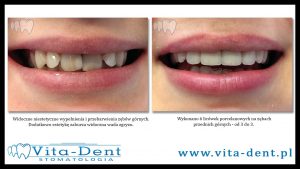
6 porcelain veneers of upper teeth






